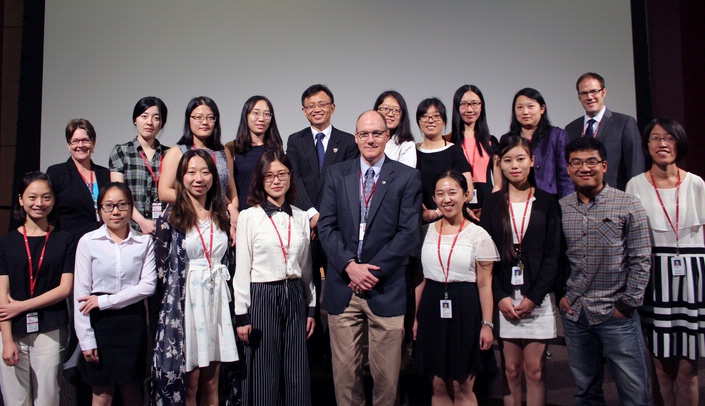For the fourth year in a row, UNMC has hosted a Mini-Symposium for participants in the Asia Pacific Rim Development Program’s Summer Research Program.
This year, 14 students from Shandong, Shanghai Jiao Tong, and Tongji Universities participated. The event was attended by Principal Investigators, lab managers, students, and others with whom the program participants had formed a relationship.
Deb Thomas, vice chancellor for business and finance, opened the Mini-Symposium. She noted the important place of the summer research program within UNMC’s China collaborations. "The summer research program extends UNMC’s reach, touching lives of people around the world," she said.
Thomas also commented on the gender ratio of the participants: "When I started out in Chemistry, I was the only woman in my courses, so it is wonderful to see so many female students here this year."
She encouraged the students to consider returning to UNMC for their future education. She said, "I know that you have faced many challenges to come here. We hope that you consider returning to UNMC for a Ph.D. or health professions degree in the future. If you do, you will be in good company. As many as 15% of your predecessors on the summer program have returned to UNMC."
Jennifer Larsen, M.D., vice chancellor for research, talked with the students about research at UNMC and the summer program within that. "UNMC has had a long history of sponsoring summer student research, and those summer students play a vital role in research at UNMC," she said. "You are working with the strongest faculty on UNMC’s campus; I hope that you take away positive memories and experiences which will help you professionally and personally."
Participants had five minutes to present the research that they have completed during their visit. Yunlong Huang, M.D., Ph.D., an instructor in Pharmacology and Experimental Neuroscience, said that he was glad that he came. "Listening to these students’ talks gave me an overview of the best work that is being done at UNMC by our best scientists in quick, five-minute presentations."
After student presentations, Dele Davies, M.D., vice chancellor for academic affairs, presented certificates to students from Shanghai Jiao Tong University. "We are very pleased that you shared your summer with us at UNMC. Congratulations on all you accomplished during your time here. From your presentations, it is obvious that you have had a wonderful experience. We hope that you return and spend more time with us in the future."
Ken Bayles, Ph.D., associate vice chancellor for research, presented certificates to students from Tongji and Shandong Universities and then offered closing remarks. He encouraged the students to thank their mentors at UNMC, saying, "It takes a lot of effort to open a lab and design a project that can be completed in a short time."
Next he mentioned the positive effect the students had during their time on campus. "Thank you for coming to UNMC and sharing your expertise and your culture. Getting to know each other and our different cultures is important – it is key to know each other beyond what we hear about in the news," he said.
He concluded by commenting on the transformative role the summer program can have. He said, "Summer research is important for your future. I did a summer research program when I was an undergraduate. Through that, I learned what science is about. I began working on Staph then, and I have continued to work on it. This program can be a guide for your future; we hope that future includes UNMC."
Jialin Zheng, M.D., director of the Asia Pacific Rim Development Program, said the summer program "does not just show wonderful research activities and opportunities to a young generation of students in China, but it is also a means of recruiting these active and talented young individuals to return to UNMC for further studies. When you show visitors how great Nebraskans are, they will come back because of that experience."
UNMC has hosted summer research program students from China since 2008. In that time, over 100 students have completed 8- to 12-week research rotations in labs across UNMC.
